Unit 3 Family matters Using language 课件(共24张PPT)-2025-2026学年外研版(2019)必修第一册
文档属性
| 名称 | Unit 3 Family matters Using language 课件(共24张PPT)-2025-2026学年外研版(2019)必修第一册 | 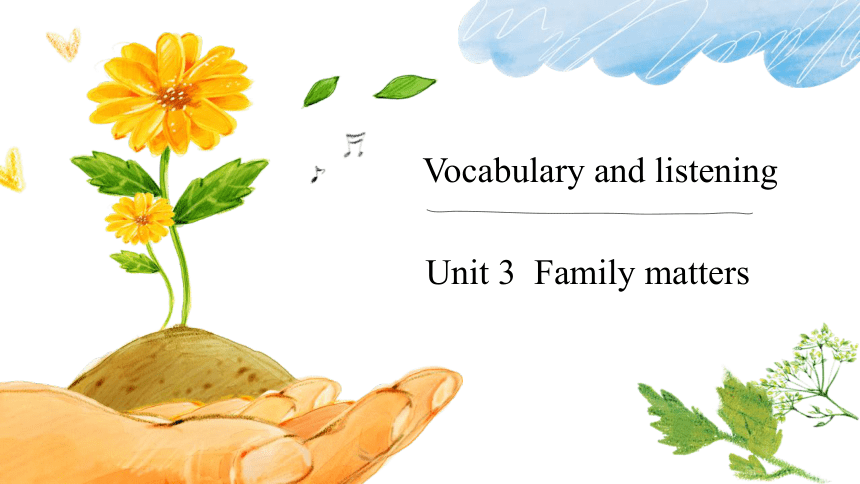 | |
| 格式 | pptx | ||
| 文件大小 | 11.8MB | ||
| 资源类型 | 教案 | ||
| 版本资源 | 外研版(2019) | ||
| 科目 | 英语 | ||
| 更新时间 | 2025-07-17 11:23:42 | ||
图片预览

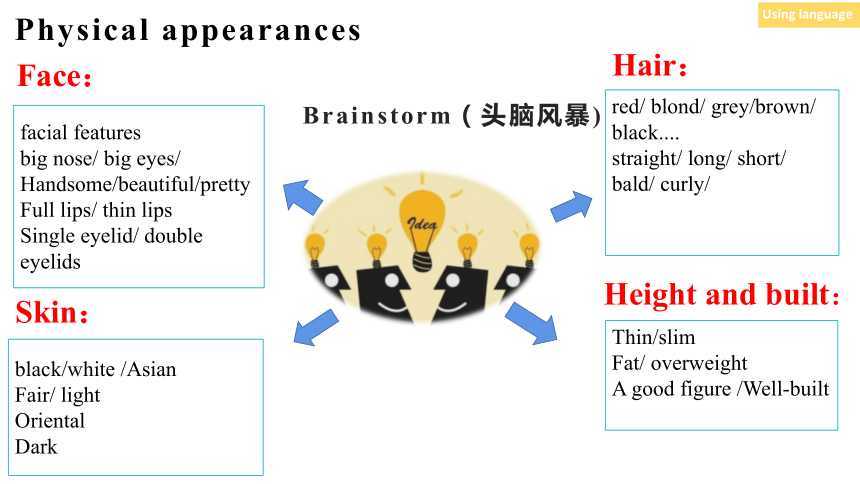
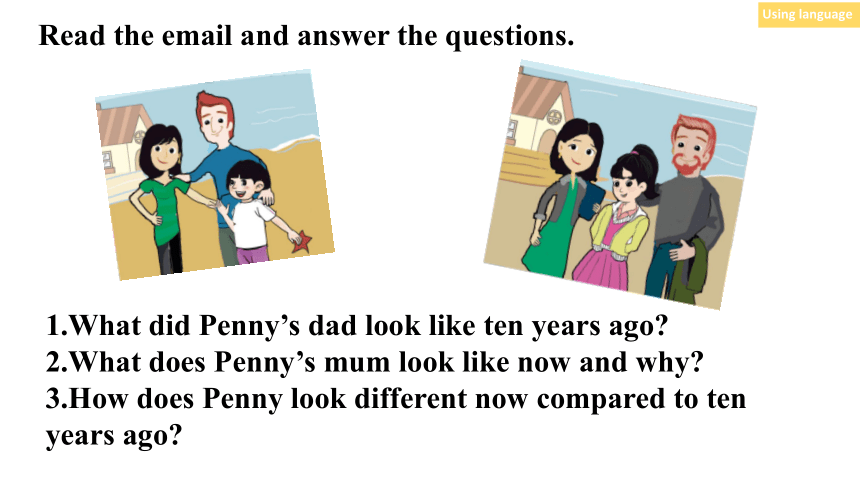
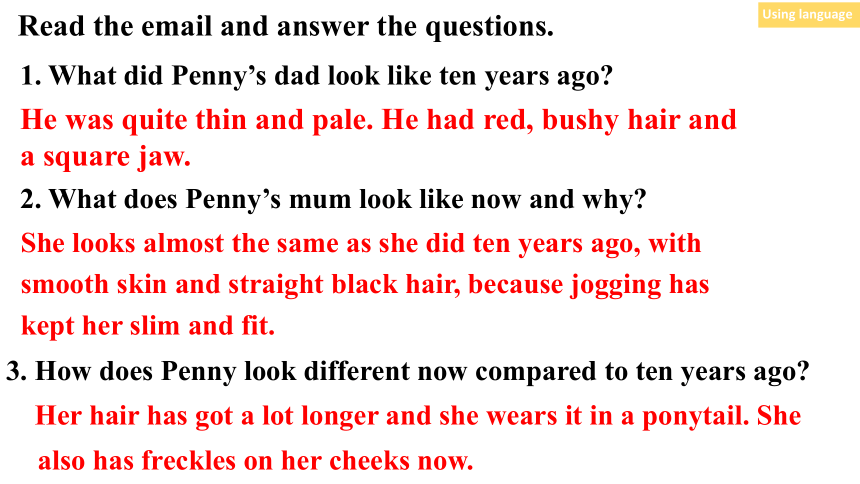
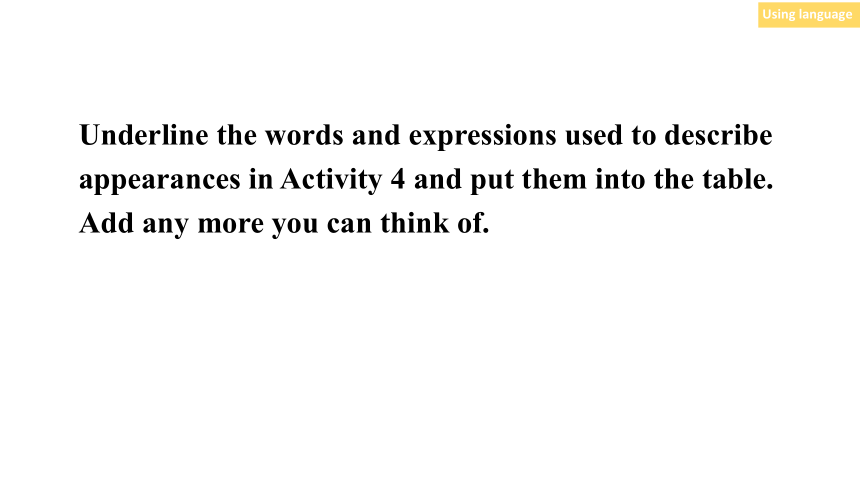
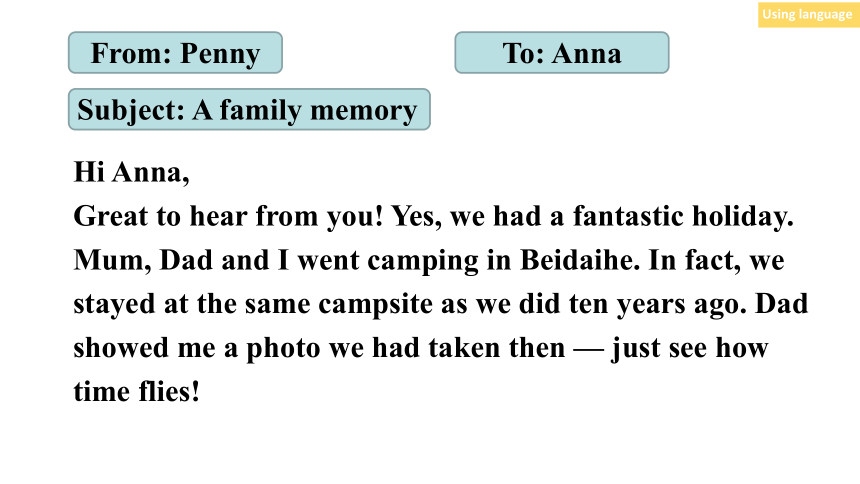
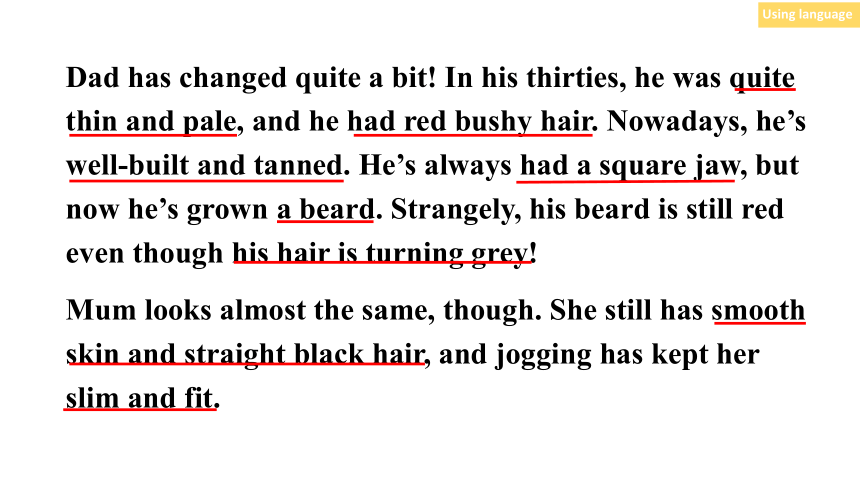
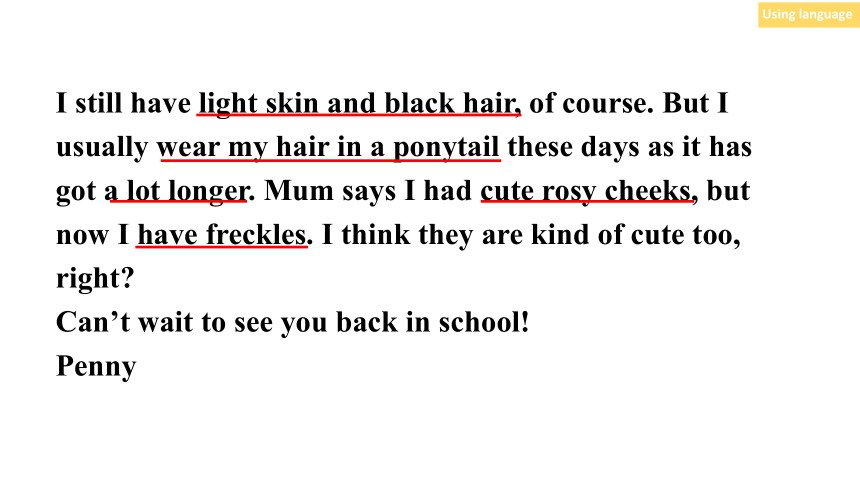
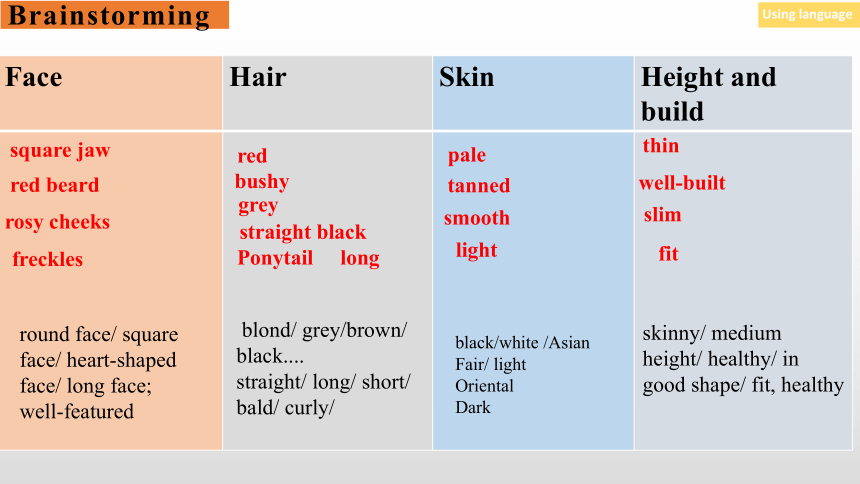
文档简介
(共24张PPT)
Unit 3 Family matters
Vocabulary and listening
Brainstorm(头脑风暴)
facial features
big nose/ big eyes/
Handsome/beautiful/pretty
Full lips/ thin lips
Single eyelid/ double eyelids
red/ blond/ grey/brown/ black....
straight/ long/ short/ bald/ curly/
black/white /Asian
Fair/ light
Oriental
Dark
Thin/slim
Fat/ overweight
A good figure /Well-built
Physical appearances
Using language
Face:
Skin:
Hair:
Height and built:
Read the email and answer the questions.
1.What did Penny’s dad look like ten years ago
2.What does Penny’s mum look like now and why
3.How does Penny look different now compared to ten years ago
Using language
1. What did Penny’s dad look like ten years ago
2. What does Penny’s mum look like now and why
Read the email and answer the questions.
He was quite thin and pale. He had red, bushy hair and a square jaw.
She looks almost the same as she did ten years ago, with smooth skin and straight black hair, because jogging has kept her slim and fit.
3. How does Penny look different now compared to ten years ago
Her hair has got a lot longer and she wears it in a ponytail. She also has freckles on her cheeks now.
Using language
Underline the words and expressions used to describe appearances in Activity 4 and put them into the table. Add any more you can think of.
Using language
Hi Anna,
Great to hear from you! Yes, we had a fantastic holiday. Mum, Dad and I went camping in Beidaihe. In fact, we stayed at the same campsite as we did ten years ago. Dad showed me a photo we had taken then — just see how time flies!
From: Penny
To: Anna
Subject: A family memory
Using language
Dad has changed quite a bit! In his thirties, he was quite thin and pale, and he had red bushy hair. Nowadays, he’s well-built and tanned. He’s always had a square jaw, but now he’s grown a beard. Strangely, his beard is still red even though his hair is turning grey!
Mum looks almost the same, though. She still has smooth skin and straight black hair, and jogging has kept her slim and fit.
Using language
I still have light skin and black hair, of course. But I usually wear my hair in a ponytail these days as it has got a lot longer. Mum says I had cute rosy cheeks, but now I have freckles. I think they are kind of cute too, right
Can’t wait to see you back in school!
Penny
Using language
Brainstorming
Face Hair Skin Height and build
skinny/ medium height/ healthy/ in good shape/ fit, healthy
square jaw
red beard
rosy cheeks
freckles
round face/ square face/ heart-shaped face/ long face;
well-featured
bushy
grey
straight black
Ponytail long
pale
tanned
smooth
light
thin
well-built
slim
fit
Using language
blond/ grey/brown/ black....
straight/ long/ short/ bald/ curly/
red
black/white /Asian
Fair/ light
Oriental
Dark
Look at the pictures and try to describe the physical appearance with the useful expressions.
He was/ had.....Now he is/ has got....
Example
When Liu Dehua was a little boy, he had bushy hair. And he was well-featured with a pair of beautiful eyes. Now, he is well-built. He has got a crew cut, a handsome face with a hooked nose. More importantly, he sets a positive example for the society.
Using language
He was / had…Now, he is / has got…
Look at the pictures and try to describe the physical appearance with the useful expressions.
Using language
18 years later, his appearance changed significantly.
Do you know the International Day of Families
Will you say sorry to your family members if you hurt them
Using language
Saying sorry to family members
The International Day of Families, which was set by the United Nations in 1993, is held on 15 May every year. The day celebrates the importance of families. It aims to deepen people‘s understanding of issues that are related to families. With a different theme each year, the day is observed (庆祝) with a wide range of events that are organised at local, national and international levels.
Did You Know
Using language
Using language
Learn some new and difficult words
upset
promise
recently
pale
hill
make it
school play
go camping
catch up 赶上/闲聊
be busy with
be off sick 休病假
on your part 对我们来说
take a day off 休假
go to the countryside
have a picnic
Using language
Listen to the conversation and choose the feelings that the speakers express.
confused
angry
upset/sad
embarrassed
sorry
happy
Using language
Listen again and complete Alice’s Journal entry.
Saturday 22 September
Today, I was in a(n)___________, but Mum missed it. Later, on the phone she apologised and explained that she was busy with work because someone was (2)_________. I wish she had come!
I know she’s been busy recently, and I understand that. I’m just worried about her. I don’t like seeing her so (3)_____________.
school play
off sick
tired and pale
Using language
I think she needs to take some time off work to (4)_______.
I told her my worries. To make up for it, next week we plan to go to the (5)____________ together. We’ll go camping and have a(n) (6)__________. Most importantly, we’ll have time to talk and (7)__________. I’m really looking forward to it!
relax
countryside
picnic
catch up
Using language
Listening material:
Alice: (sadly) Mum, it's me...
Mum: Alice What's wrong You 1.____________.
Alice: (sadly) I knew it...
Mum: Oh, no! I forgot, didn't I Your concert was today, and 2.____________!
Alice: It wasn't a concert. It was the school play. And yes, you missed it.
Mum: Alice, I'm so sorry! I was really 3.____________ work. Someone was off sick, so I had to do his work, too.
Alice: Couldn't you have asked someone else to do it I know work is very important to you, it's just… Everyone said I was really good in the play. I wanted you to see it, too.
Mum: I'm sorry I didn't 4.____________, dear. You worked so hard on your part, and I'm so proud of you. I should have been there. I promise I'll never do it again! Can you forgive me
sound upset
I missed it
busy with
make it
Using language
Listen again and complete the listening material.
Listening material:
Alice: It's all right. I understand you're very busy. But you've worked so much recently. You need some time off to relax. I don't like seeing you so tired and pale.
Mum: I know, dear. Perhaps next week I could 5.____________, and we could go to the countryside.
Alice: (happily) That sounds wonderful! We can 6.____________and have a picnic in the hills.
Mum: And we can really talk and 7.____________!
Alice: I'd love that!
Mum: OK, I'll talk to my manager about it. Bye for now!
Alice: Bye, Mum! Love you!
take a day off
go camping
catch up
Now talk about how Alice’s mother makes an apology.
Using language
I’m so sorry!
I’m really sorry that…
Can you forgive me
Please forgive me for…
Please don’t be angry with me…
I didn’t mean to...
It’s OK.
It’s all right.
I understand that…
Let’s forget about it.
Don’t worry about it.
Using language
Now talk about how Alice’s mother makes an apology.
Work in pairs. Think about another situation in which you need to make an apology and have a similar conversation.
Learning to learn
Placing stress on particular words can have a big impact on the meaning and strength of apologies. For example. Saying “I am sorry” has more of an impact than “I’m sorry”. Another way of strengthening an apology is by using and stressing adverbs: I’m really sorry, I’m so sorry.
Using language
Act out the conversation to apologise to a family member.
Student A
You’re Student B’s son / daughter. Student B asked you to teach him / her how to use a new app to take photos. You started to help but soon became very impatient. Now, you feel sorry about your behaviour. Apologise to Student B and make up.
Using language
Student B
You’re Student A’s father / mother. You wanted to learn how to use a new photo-taking app, so you asked Student A for help. However, he / she was very impatient. Now Student A wants to apologise to you. Accept the apology and comfort him / her.
Using language
Unit 3 Family matters
Vocabulary and listening
Brainstorm(头脑风暴)
facial features
big nose/ big eyes/
Handsome/beautiful/pretty
Full lips/ thin lips
Single eyelid/ double eyelids
red/ blond/ grey/brown/ black....
straight/ long/ short/ bald/ curly/
black/white /Asian
Fair/ light
Oriental
Dark
Thin/slim
Fat/ overweight
A good figure /Well-built
Physical appearances
Using language
Face:
Skin:
Hair:
Height and built:
Read the email and answer the questions.
1.What did Penny’s dad look like ten years ago
2.What does Penny’s mum look like now and why
3.How does Penny look different now compared to ten years ago
Using language
1. What did Penny’s dad look like ten years ago
2. What does Penny’s mum look like now and why
Read the email and answer the questions.
He was quite thin and pale. He had red, bushy hair and a square jaw.
She looks almost the same as she did ten years ago, with smooth skin and straight black hair, because jogging has kept her slim and fit.
3. How does Penny look different now compared to ten years ago
Her hair has got a lot longer and she wears it in a ponytail. She also has freckles on her cheeks now.
Using language
Underline the words and expressions used to describe appearances in Activity 4 and put them into the table. Add any more you can think of.
Using language
Hi Anna,
Great to hear from you! Yes, we had a fantastic holiday. Mum, Dad and I went camping in Beidaihe. In fact, we stayed at the same campsite as we did ten years ago. Dad showed me a photo we had taken then — just see how time flies!
From: Penny
To: Anna
Subject: A family memory
Using language
Dad has changed quite a bit! In his thirties, he was quite thin and pale, and he had red bushy hair. Nowadays, he’s well-built and tanned. He’s always had a square jaw, but now he’s grown a beard. Strangely, his beard is still red even though his hair is turning grey!
Mum looks almost the same, though. She still has smooth skin and straight black hair, and jogging has kept her slim and fit.
Using language
I still have light skin and black hair, of course. But I usually wear my hair in a ponytail these days as it has got a lot longer. Mum says I had cute rosy cheeks, but now I have freckles. I think they are kind of cute too, right
Can’t wait to see you back in school!
Penny
Using language
Brainstorming
Face Hair Skin Height and build
skinny/ medium height/ healthy/ in good shape/ fit, healthy
square jaw
red beard
rosy cheeks
freckles
round face/ square face/ heart-shaped face/ long face;
well-featured
bushy
grey
straight black
Ponytail long
pale
tanned
smooth
light
thin
well-built
slim
fit
Using language
blond/ grey/brown/ black....
straight/ long/ short/ bald/ curly/
red
black/white /Asian
Fair/ light
Oriental
Dark
Look at the pictures and try to describe the physical appearance with the useful expressions.
He was/ had.....Now he is/ has got....
Example
When Liu Dehua was a little boy, he had bushy hair. And he was well-featured with a pair of beautiful eyes. Now, he is well-built. He has got a crew cut, a handsome face with a hooked nose. More importantly, he sets a positive example for the society.
Using language
He was / had…Now, he is / has got…
Look at the pictures and try to describe the physical appearance with the useful expressions.
Using language
18 years later, his appearance changed significantly.
Do you know the International Day of Families
Will you say sorry to your family members if you hurt them
Using language
Saying sorry to family members
The International Day of Families, which was set by the United Nations in 1993, is held on 15 May every year. The day celebrates the importance of families. It aims to deepen people‘s understanding of issues that are related to families. With a different theme each year, the day is observed (庆祝) with a wide range of events that are organised at local, national and international levels.
Did You Know
Using language
Using language
Learn some new and difficult words
upset
promise
recently
pale
hill
make it
school play
go camping
catch up 赶上/闲聊
be busy with
be off sick 休病假
on your part 对我们来说
take a day off 休假
go to the countryside
have a picnic
Using language
Listen to the conversation and choose the feelings that the speakers express.
confused
angry
upset/sad
embarrassed
sorry
happy
Using language
Listen again and complete Alice’s Journal entry.
Saturday 22 September
Today, I was in a(n)___________, but Mum missed it. Later, on the phone she apologised and explained that she was busy with work because someone was (2)_________. I wish she had come!
I know she’s been busy recently, and I understand that. I’m just worried about her. I don’t like seeing her so (3)_____________.
school play
off sick
tired and pale
Using language
I think she needs to take some time off work to (4)_______.
I told her my worries. To make up for it, next week we plan to go to the (5)____________ together. We’ll go camping and have a(n) (6)__________. Most importantly, we’ll have time to talk and (7)__________. I’m really looking forward to it!
relax
countryside
picnic
catch up
Using language
Listening material:
Alice: (sadly) Mum, it's me...
Mum: Alice What's wrong You 1.____________.
Alice: (sadly) I knew it...
Mum: Oh, no! I forgot, didn't I Your concert was today, and 2.____________!
Alice: It wasn't a concert. It was the school play. And yes, you missed it.
Mum: Alice, I'm so sorry! I was really 3.____________ work. Someone was off sick, so I had to do his work, too.
Alice: Couldn't you have asked someone else to do it I know work is very important to you, it's just… Everyone said I was really good in the play. I wanted you to see it, too.
Mum: I'm sorry I didn't 4.____________, dear. You worked so hard on your part, and I'm so proud of you. I should have been there. I promise I'll never do it again! Can you forgive me
sound upset
I missed it
busy with
make it
Using language
Listen again and complete the listening material.
Listening material:
Alice: It's all right. I understand you're very busy. But you've worked so much recently. You need some time off to relax. I don't like seeing you so tired and pale.
Mum: I know, dear. Perhaps next week I could 5.____________, and we could go to the countryside.
Alice: (happily) That sounds wonderful! We can 6.____________and have a picnic in the hills.
Mum: And we can really talk and 7.____________!
Alice: I'd love that!
Mum: OK, I'll talk to my manager about it. Bye for now!
Alice: Bye, Mum! Love you!
take a day off
go camping
catch up
Now talk about how Alice’s mother makes an apology.
Using language
I’m so sorry!
I’m really sorry that…
Can you forgive me
Please forgive me for…
Please don’t be angry with me…
I didn’t mean to...
It’s OK.
It’s all right.
I understand that…
Let’s forget about it.
Don’t worry about it.
Using language
Now talk about how Alice’s mother makes an apology.
Work in pairs. Think about another situation in which you need to make an apology and have a similar conversation.
Learning to learn
Placing stress on particular words can have a big impact on the meaning and strength of apologies. For example. Saying “I am sorry” has more of an impact than “I’m sorry”. Another way of strengthening an apology is by using and stressing adverbs: I’m really sorry, I’m so sorry.
Using language
Act out the conversation to apologise to a family member.
Student A
You’re Student B’s son / daughter. Student B asked you to teach him / her how to use a new app to take photos. You started to help but soon became very impatient. Now, you feel sorry about your behaviour. Apologise to Student B and make up.
Using language
Student B
You’re Student A’s father / mother. You wanted to learn how to use a new photo-taking app, so you asked Student A for help. However, he / she was very impatient. Now Student A wants to apologise to you. Accept the apology and comfort him / her.
Using language
